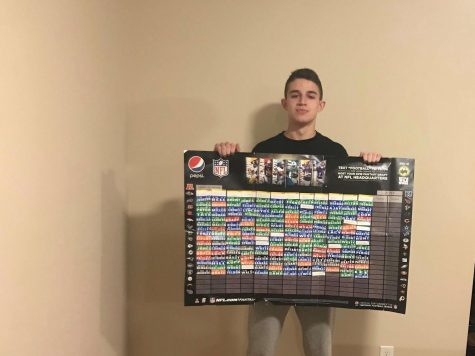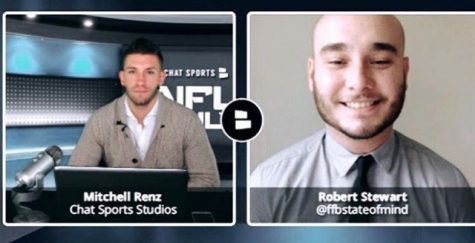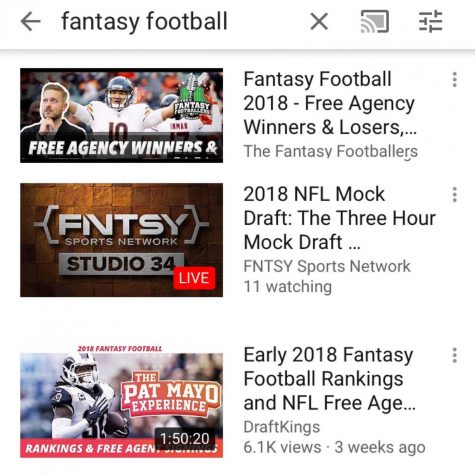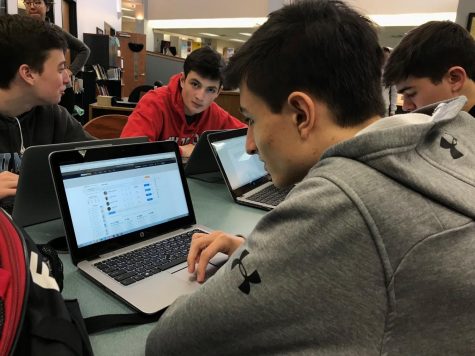Living in a Fantasy World
June 13, 2018
Rise to the Top
Jeremy sat intently, eyes glued to the screen. The new year was growing closer, and the rooms of the house echoed with the laughs and conversations of family members. For Jeremy, there was some unfinished business, a fantasy championship was waiting to be won. What was on the line? Was it money? Pride? To some, the game of fantasy football is just meaningless jumble of numbers and statistics. To many others, it is much more than that.
Jeremy, who had begun playing fantasy football when he was just about 13, was thrust into the fantasy football world with almost no knowledge at all. His friends, who all were avid football fans, spoke of starting a fantasy football league. Not wanting to seem like the odd man out, Jeremy played along and expressed his eagerness to be in a league. He said, “Yea let’s do it…and next thing I knew I was at a draft.”
The draft had begun as quickly as he had learned about its existence, and the clock was ticking. A list of players was on the screen, an array of numbers and buttons was arranged all around the players. One could sort by position or projected draft pick or projected points. Possibilities were endless. His understanding of player ‘ratings’ and abilities could pretty much only be derived from video games as he was not a meticulous football spectator.
So, basing his draft strategies on Madden 11 player ratings, which was a game released in 2010, Jeremy went about the draft in with what little knowledge he had acquired years ago. Unfortunately, four years is an eternity in the NFL, and things had changed dramatically since Madden 11 ratings were created.
Some of the biggest blunders that Jeremy drafted were Wes Welker and Reggie Bush. If we turn back the clock to 2010 and the 2011 season, the year in which Madden 11’s ratings were derived and last updated, these players were were quite viable. Wes Welker was showing great promise, and after a respectable 2010 season, he burst onto the scene with 1500 receiving yards. That certainly warranted an increase in rating! Reggie Bush saw a similar trajectory, as in 2011, he amassed 1000 rushing yards for the Miami Dolphins. Now let’s return to 2014, where Jeremy’s first fantasy season began. Sadly, these once prosperous players had passed their primes. In the 2014 season, both players barely combined for a 1000 yards and a measly 4 touchdowns.
An injury plagued season befell upon his first round pick Calvin Johnson Jr.. Failure was inevitable, and Jeremy failed to make the playoffs. The good news was he had learned a lot, and the only direction to go was up. In the next year, the league was expanded, from eight people to twelve people, and an entry fee was required. The entry fees were pooled together and set as the prize for the championship winner. Money was on the line now, meaning things just got more serious for everyone in the league.
Jeremy quickly picked up on the depth and the players out there and how to value players, as well as the opportunity costs of having them. He prepared for the draft yet did not look to others opinions on who to draft, as many fantasy players do. Each year there are ‘consensus’ top players, but Jeremy disregards these and drafts whom he believes in. It was through that method that he was able to delineate himself from the competition.
He continues using this strategy to this day and acknowledges that there’s no certainty in fantasy football, saying “no matter what, there’s going to be a ton of people that bust (fail) and a ton of people that boom (succeed).” In his second year of fantasy, Jeremy found himself vesting more emotion into his league, which resulted in heated rivalries and intense games.
Things clicked for Jeremy in his second year. A slow start to the season quickly turned around, and he rode a winning streak through the playoffs into the championship.
A fantasy championship berth meant months of hard work were on the verge of validation.
He sat in the cozy living room of his cousins’ Massachusetts home, the skylight above allowing a slight evening hue to seep in. Jeremy was focused on the large television, which relayed the broadcast of NFL Redzone, a fantasy football centered TV channel which has been described by some as a “simultaneous highlight reel.” Their two teams had been trading blows every play, and the game was close and intense. He recalls a specific play when, “Blake Bortles of the Jaguars had the ball at the 30 yard line going into the endzone. He rolled out left and threw a spiral to Allen Hurns, and when he caught that, I knew I had won.” The championship was so important because he felt he was a dark horse, an underdog, and the championship was something that he had worked very hard for.
For Jeremy, fantasy completely changed his view of the game.

Strategy
Something that was important for Jeremy was having a belief in his team, and if he felt a twinge of doubt, he acted fast. A unique aspect of fantasy football is all the tools at your disposal that allow you to alter your team. These tools are things such as the ability to trade and the waiver wire.
Research into the demographics of fantasy football has illuminated tendencies of fantasy players. Around 40% of fantasy players primarily use a mobile device for fantasy sports. Offering and evaluating trades and researching free agents make up around 25% of all activities players access their fantasy website for.
Jeremy enjoys checking the waiver wire as it is unique because one can acquire a viable player at essentially no cost.
It can be difficult to pick up the ‘right’ player, as a waiver wire player is likely shrouded with mystery. Does the player have a chance to breakout? Is there new opportunity for said player? It is important to do your research when deciding who to pick up.
Every year there are “waiver wire gems,” or players that performed at a top level despite starting the season as widely un-owned. This past year, players such as Alex Smith and Alvin Kamara. Both players likely went undrafted yet finished top 5 in scoring at their respective positions.
The other tool one may utilize is the trade feature. This is a personal favorite and one of the most exciting aspects of the game.
The class was quiet and the surrounding students stared intently at their textbooks. Alex’s eyes were fixed on his phone screen, his fingers swiping left and right, up and down, across the grooves of the cracked glass. He was formulating a plan, a transaction that would benefit both parties, yet provide his roster with sufficient ammunition to rocket to the top. Notifications popped up as messages trickled in, the negotiations were beginning. Is Alex aiming for a blockbuster deal or targeting some ‘role’ players? Who knows, for even Alex can’t be certain as when one the sphere of trades, anything can happen.

The transaction refers to a potential trade between two fantasy teams. Why might a team owner want to execute a trade? There are a plethora of reasons. Perhaps ones’ roster is in possession of excess players at one position, and can deal one of those players to fill another need. Maybe an owner sees a breakout on the horizon for a certain player, and hopes to acquire him before he becomes too valuable. It is plausible even that a trade would occur as a result of an arbitrary feeling of wanting to ‘switch things up’.
There is often an element of secrecy when engaging in ‘trade talks’. Other league members are quick to make sweeping comments about potential offers, which can be alienating to one or both parties. Secrecy can also be a detriment to leagues, as accusations of collusion and coercion are rampant , especially when a trade seems lopsided or unfair. However, in reality, players that one traded for or traded away constantly fail expectations as often as they meet or exceed expectations.
Despite what anyone will tell you, there is no validity to the idea that one player is guaranteed to be better or worse than another. On the other hand it is important to remember to understand that there are ludicrous offers that one must never accept, as in a game of chance, you should always keep the players that improve the probability of success.
Who plays fantasy football?
With over 60 million players aged 12 and up across the USA and Canada, there is no doubt that there are many different types of people that enjoy the game of fantasy football.
One would think it typical that teenagers are a popular demographic for fantasy football, and they would be correct. However, a large amount of adults play fantasy football, and they are not ‘losers’, a label that is often applied to the players of fantasy football. Many successful adults, both men and women, choose to take a part in this fantasy world, both directly in the industry, and as players. In fact, over two-thirds of the adults partaking in fantasy sports have full time employment, according to a recent study buy the Fantasy Sports Trade Association.
Brian Weinberg, who teaches Math subjects at Glen Rock High School, who was first introduced to fantasy sports over 15 years ago, continues playing to this day. At 27 years old, many consider him a young man. But as a full-time teacher and assistant track coach, Weinberg has many things and responsibilities to handle before he can spend time doing leisurely activities.
Nonetheless, he finds time to spare for the game of fantasy football. He feels that there has been a huge shift in fantasy football with the availability of information
Weinberg holds a unique perspective, explaining that the game of fantasy football has led him to, “see (ing) everybody in terms of mathematical numbers.” He elaborated, saying that often times he disregards some players as meaningless or bad, when in reality, it is just because their skill-set isn’t conducive to fantasy football. An issue that is often brought up by both pro players and media alike, is the fact that it almost dehumanizes the game. In addition, it has been said that fantasy football takes away one’s interest in the special non-statistical football moments that make the sport so great.
In Weinberg’s league, the person who finishes in last place is subject to the punishment of taking the SAT, which is a long and menial task for him and his league mates, who have already paid their dues to the academic community. Weinberg and his league-mates also produce a weekly wrap up show for their league, that outlines the results of those weeks games and what’s to come in the near future. The great thing about fantasy football is the outlet of creativity in can provide.

Of all the aspects of fantasy football, the games, the trades, the rivalries, Weinberg values the connectivity that the platform of fantasy football provides. He is in a league with his friends from high school, and as one moves on to college and then into the ‘real world,’ it is often hard to stay in touch. Fantasy football allows Weinberg and his buddies to come together and stay in touch while doing something they all enjoy.
Incentives
What makes fantasy football so special? Money? Demand? The sport of football itself? The benefits of playing fantasy sports are abundant.
For example, let’s explore an obvious incentive. How can playing fantasy football make money?
The most common way money is involved with fantasy football is in the form of a cash prize. The prize is typically awarded to the winner. Many of the people I talked to were members of 10-12 team leagues, where a fee was paid to enter. The fee for these leagues can vary greatly, with some being on the low end of 5$, and others hitting numbers well over $1000. Many of the people I spoke to had entry fees around $100.
The fees are added up and are set as the prize for the championship winner. Most people do not only play fantasy for the money, as $1000 is not a life-changing sum to acquire. However, it does raise the competition to a new level.
In today’s day and age, there is a whole new sphere of fantasy sports that has burst onto the scene. Daily fantasy sports, aka DFS, is quickly becoming the hottest thing in the industry. It is here that gambling and sports fuse into one competitive world, where fantasy points are king. The average spending over a 12-month period in DFS is almost double what it is in “traditional” fantasy leagues.
I’ve only participated in DFS in a minimal capacity. As I’ve taken a more inquisitive look into the DFS atmosphere, I can easily understand why it is so appealing to the millions that are involved. For one thing, you can change and edit lineups in a second, you don’t have to worry about trading for players, or picking players up off a waiver wire. Every week is a clean slate, the bad decisions of the previous match will not linger, and you have no commitment to any of the players you have chosen on past teams.
In addition, money can be lucrative. Stories of million dollar winners are glorified, and many other people have made tens of thousands through sites such as DraftKings and Fanduel. However, not all games are “big money.” Many DFS players are perfectly content with winning one, two, or three dollars for a competition they win. Daily fantasy is unique in that it truly allows for a different champion every week.
Incentives do not stop at cash, and an underrated motivator is bragging rights and pride. Specifically for people that are in season-long leagues with close friends or co-workers, there is just something special about defeating your opponent. It is these rivalries that I, like many others, that make the game of fantasy football so captivating.
I would consider myself very competitive, with the stipulation that I consider myself apt at what I am competing at, otherwise, I don’t mind being subpar. So when I am facing my close friend in a head to head matchup, a win has me eager to take on my “real” responsibilities, while a loss leaves me sulking over my lineup mistakes and erroneous decisions.
Every person who participates in fantasy football is unique in their motivations for participating and what they reap from playing.
Making Connections
Don’t get it twisted, fantasy football is fun. However, it has quickly become a thriving industry that has provided thousands of jobs. Social media platforms such as Twitter, Instagram, and YouTube opened the door for fantasy sports media to spread and expand.
Robert Stewart, a 28 year old resident of San Diego, is one who has had a unique experience when it comes to fantasy football. Around 2009, he began playing. Despite not even being ten years ago, the world of fantasy football was early, and the apps and hubs of today were either nonexistent or developing.
Soon thereafter, in 2011, Robert ‘fell’ for the game of fantasy football. And three years later, 2014, he created the instagram account FantasyFootballStateofMind. While fantasy content was abundant on Twitter, he realized the scarcity of it on Instagram.
The account gained traction relatively quickly. Posts engaged followers, and the introduction of Instagram Video introduced whole new arsenal of fantasy content that could be uploaded. Posts are centered around starting a conversation. For example, Robert might post a statistic pertaining to a increase in receiving touchdowns in the NFL and ask how does it affect your take on wide receivers this year?
As the account grew, so did the amount of time it took to maintain it. Robert, a digital marketer with a wife and 7 year old son, has a busy schedule. When he began the account, he did not foresee then success it would garner. This past year, sponsorships and partnerships related to the account netted around five thousand dollars. It is not about the money for Robert, he is just happy that there are so many people who share his interest in fantasy football. Now with a following of over thirty thousand, FantasyFootballStateofMind is one of the top fantasy football Instagram accounts out there. Robert hopes to reach the century mark in the near future.
While he did mention his ‘competition’, he stresses that everyone in the industry, content creators, players, and followers, are part of a community. Robert enjoys collaborating with other account owners and fantasy column writers.

It is interesting to see how business comes into play with fantasy football, outside of the fantasy apps and websites that people play on of course. Anthony Scotto Sr., a Glen Rock resident and sales manager at Dell EMC, is a both a fan of football and the game of fantasy football. He says that fantasy sports have allowed him to make connections with clients. It has made it possible for him to communicate with clients on a more casual level, and build relationships, which can be beneficial when it comes to the business side of things.
As a man in his 40s, Scotto has seen the fantasy industry grow from a game that was played by some groups of people to something that has become mainstream. He is amazed at how big the game has become, and how easy it is to access information. His kids have taken to the game, and it is interesting to see how the game is being passed through a generation.

Draft Season
Most fantasy football seasons last a maximum of seventeen weeks, so once that is over, there is nothing left to do with fantasy football. If you think that, you would be incorrect. Soon after the NFL season is over, ’draft season’ begins.
Draft season refers to the time before the season officially begins again, when the NFL Draft occurs as well as the drafts of numerous fantasy leagues. A majority of the fantasy drafts are held in August and early September, but dynasty league drafts normally work in conjunction with the NFL Draft, as new rookies must be chosen to the teams in dynasty leagues. A dynasty league is just a type of fantasy league that runs all year long, and there is no re-draft of players, just a small draft of the rookie class each year.
These leagues are good for people that plan on being dedicated to fantasy football for a long span of time.
Sophomore David Viggiano, who just started playing fantasy football this past year, was immediately taken with the whole concept. However, after a quick but fruitful season, Dave felt that he wanted to jump right back into fantasy football. So he organized a dynasty league and set the draft for early March.

A group of Dave and his buddies gathered in his basement to make their selections. Their minds full of information. Information pertaining to fantasy football, as the draft board stands vacant of players. A pile of names sits ready to be picked, a mass of positions and possibilities. The WiFi is being strained as the boys scroll through Google and Twitter feeds, reading words from NFL analysts, and browsing through the projections. Who will go first overall? Which player is the golden jewel of this year’s plunder. Dave teems with excitement, he’s been preparing this for what seems, a lifetime. The others, are equally prepared. They refer to their rankings, all distinctly different, but with the same goal in mind, to draft the best players.
With the first overall pick, Dave has the ability to choose anyone he wants, and no one can interfere. However, he also feels the pressure of making a decision between all the top tier players, and the fear of making the wrong choice. Will it be Ezekiel Elliot, the young star running back of the Dallas Cowboys, or Odell Beckham Jr., football’s most polarizing receiver?
The clock ticks and the selection is in. The pick was a surprising one, and the boys voice their doubts. Deandre Hopkins, of the Houston Texans, who’s coming off an outstanding season, is David’s choice. While there are questions surrounding Hopkin’s consistency or ability to produce with sub-par quarterback play, Dave believes that his immense talent will prevail. Who will go next?
Wrap Up
In this fantasy world, anything can happen. Any player can succeed, can fail, can go from a last round draft pick to a first round draft pick within a year. Beating the odds can be aided with hours of research and analysis, but it can also happen out of sheer luck.
However you choose to play, whether your goal is to make a few bucks, beat your friends, or just to socialize with others, fantasy football is the game for you. If you’ve never played before, I recommend giving it a shot, for this article is just a small window into the vast amounts of people that have enjoyed their fantasy football experience.



